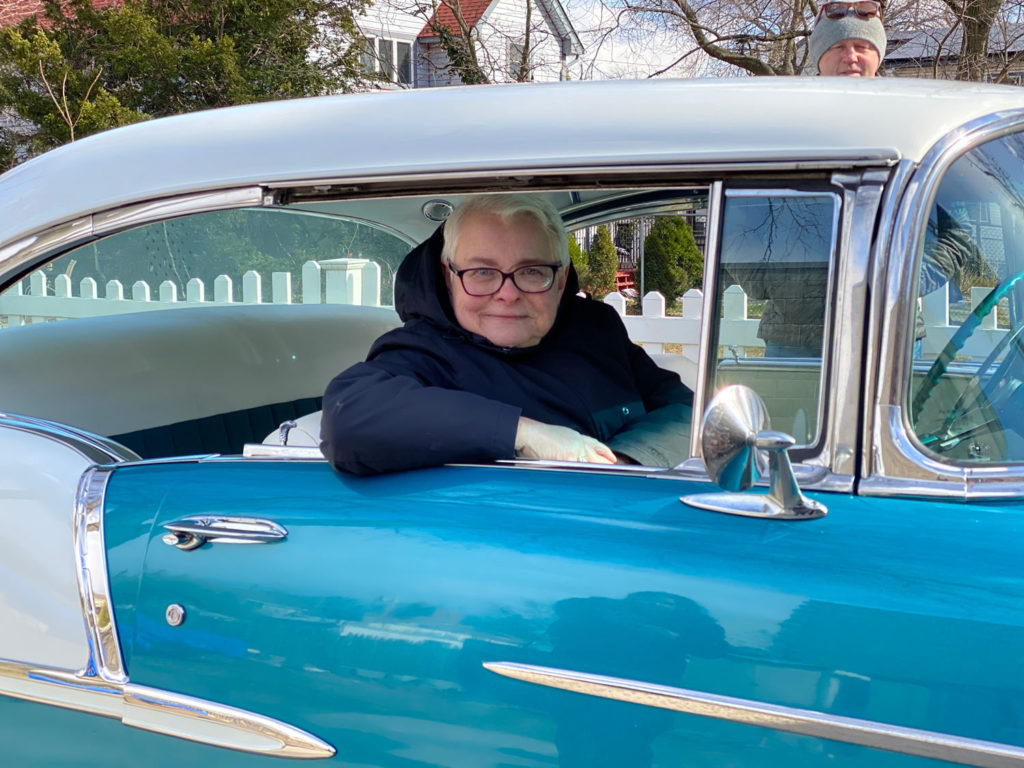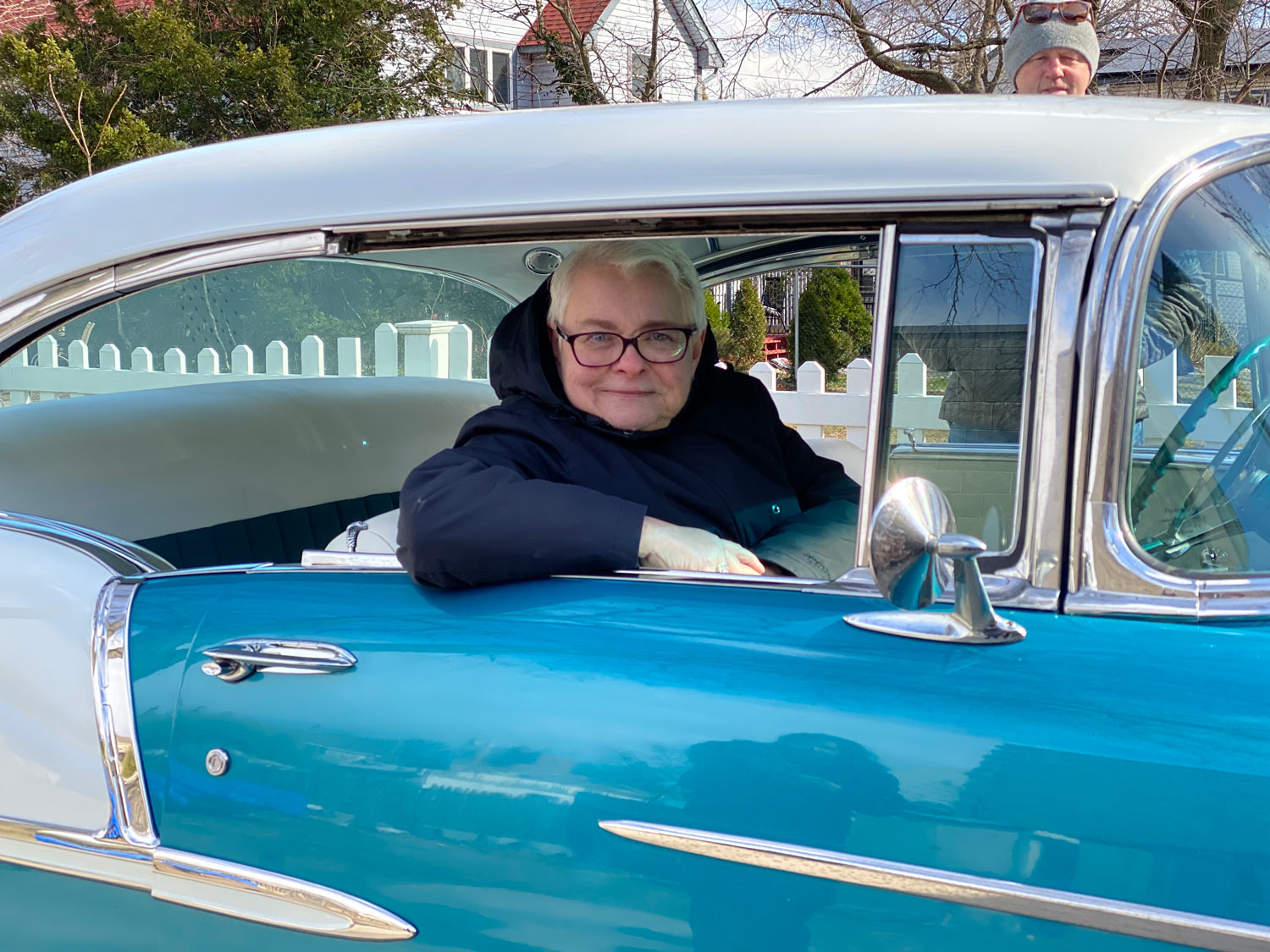Sometimes the road to Broadway can take many turns. In the spring of 2020, Paula Vogel’s Pulitzer Prize-winning play, How I Learned to Drive, was in rehearsal and set to open in New York when theaters across the country suddenly closed due to the pandemic.
But would this challenging play about sexual abuse—which took more than two decades to mount a Broadway production return when theaters reopened?
On April 19, the production will open on Broadway starring Mary Louise Parker and David Morse both back from from the play’s Obie-winning, off-Broadway production 25 years ago, staged by its original director Mark Brokaw. After a long career of being one of the leading female American playwrights, How I Learned to Drive is only Vogel’s second play to make it to Broadway. The other was Indecent, which also began its life at the off-Broadway Vineyard theater before moving to the main stem.
“In many ways, I was grateful for this time,” says Vogel of the pandemic pause from her home in Wellfleet on Cape Cod, where she lives with her wife, author Anne Fausto-Sterling.
 For Vogel, the time gave her the chance to work on a wave of projects, including producing a dozen works on-line by other playwrights in the “Bard at the Gate” project for the McCarter Theatre Center in Princeton, N.J.
For Vogel, the time gave her the chance to work on a wave of projects, including producing a dozen works on-line by other playwrights in the “Bard at the Gate” project for the McCarter Theatre Center in Princeton, N.J.
Another was writing her first memoir, Travels Without Carl, based on her cross-country road trip when she visited women’s bars through the Deep South and West, following the death of her brother from AIDS in 1988. She also continued her playwriting workshops on-line, including a one specifically for veterans. Vogel, an acclaimed playwriting professor, mentor, and theatrical guru (with many students going on to earn Pulitzer Prizes and Tony Awards of their own) is also halfway through a book on the art of playwriting.
Not enough? Waiting in the wings is a project for directors Marianne Elliott (Company) and Steven Hoggett (War Horse), based on the novel They Shoot Horses, Don’t They? which was made into a Sydney Pollack film in 1969 starring Jane Fonda. And, oh yes, she even started a new play. Too early to talk about that one, she says.
Pedophilia Revisited
Right now, Vogel is focused on the Broadway bow of How I Learned to Drive and is curious to see how this provocative story would be received in the context of a much different time.
The play centers on a Li’l Bit, a woman who tells the story of the complex relationship between herself and her aunt’s charming husband, Uncle Peck, who sexually abuses her in this memory play that runs backwards her teenage years to her pre-adolescence.
Ben Brantley of The New York Times wrote in his review of the original production of Vogel’s “clear-eyed empathy in portraying the incalculable damage done by damaged people.”
Vogel says she wrote the play because she wanted to tell her own story, “But I couldn’t tell it directly back then of my own uncle.” When the play premiered in the ’90s she promised her mother that she wouldn’t say it was autobiographical.
Vogel says she became fascinated with the Vladimir Nabokov novel Lolita and the author’s portrayal of the character of Humbert Humbert, a man who becomes obsessed with a 12-year-old girl whom he sexually molests after he becomes her stepfather.
“The benefit of making a drama from a young girl’s point of view is that it’s something that we process publicly as a community,” says Vogel. “So my question was: Do we, as survivors, gain more agency and more power if we can work our way towards empathy for the predators? That was the major question for me, and I thought about it for 15 or 20 years before I felt I had the ability to tell the story. I had traveled far enough away from the trauma to reach that point of empathy.”
The play opened off-Broadway in 1997 in at a time when discussions of sexual predators and pedophilia were rarely publicly discussed, and when they were, it didn’t go well for the victims.
Vogel points to Anita Hill who made headlines during the confirmation hearings of U.S. Supreme Court Justice Clarence Thomas, accusing him of sexual harassment when he was her supervisor. Since then there have been countless stories of sexual predatory actions by clergy, coaches, politicians and educators, and by such high-profile men as Jeffrey Epstein, Harvey Weinstein and Donald Trump. Often the victims speaking out are the ones who are attacked because of the lapses of time until they step out to tell their stories.
“That’s the thing in revisiting trauma,” says Vogel. “Like the question of why did it take Christine Blasey Ford so long to come forward [against the nomination of Brett Kavanaugh when he was a nominee for the U.S. Supreme Court]. There is a need to let your intimates know and then trying to get beyond it. But there also comes a time when it’s your responsibility to make it public. I’m very curious to see how an audience responds today to the play today.
Theater changed by the pandemic
“How can we not come back into the theater after what we’ve all gone through and not have a different perspective?” asks Vogel. “The isolation that we’re all feeling [due to the pandemic] is something Li’l Bit—and all of us—have. When we’re burying all our sorrows, secrets, and wounds, we feel that isolation. We’re only going to process it by coming forward and being with other people. So, I am hoping How I Learned to Drive tells us we are not alone, that no one is facing this alone, that you can tell your secrets and what you’re bearing to other people, and it makes it lighter.”
The theatrical landscape has changed, too, she says, because of the #MeToo stories, Black Lives Matter movement and women’s renewed calls for equality in the workplace.
“Though hardly a few seasons go by without another revival of a play by David Mamet, it’s very rare for women to get revivals during their lifetime.”
But she notes this season seen significant change for female writers. There are revivals of Adrienne Kennedy’s Ohio State Murders and Ntozake Shange’s for colored girls who have considered suicide/when the rainbow is enuf; Lynn Nottage’s Intimate Apparel is re-crafted as a chamber opera; and Alice Childress’s Trouble in Mind finally made it to Broadway decades after her death.”
The pandemic has accelerated change when it comes to virtual connections in the theater.
“We’ve been very small-minded about this,” she says. “I feel we’ve been insisting on how superior and unique live performances are, and that’s true. But the notion of digital theatre just being ‘heads in a box’ isn’t true anymore.
“For the last 19 years I’ve lived in a small fishing village and in the dead of winter I have been able, should I wish, to walk to a small theatre and watch the Metropolitan Opera [live and on an HD screen]. Is it as wonderful as being there in person? Well, it’s different.
“If only we had embraced broadcasting theatre the way, for example, baseball and football do. Is watching it on screen a different experience than sitting in a stadium in freezing cold weather surrounded by thousands of people? Of course it is. But would we have the accessibility to sports without that broadcast? By insisting theater only be live is making it inaccessibile and unaffordable. We’re not getting the diversity of choices out there because we’re insisting that it can be only live. This is a completely wrong-headed way to go. In the arts, supply creates demand. We have been cutting off the supply by insisting that it be live.”
There’s one major change, however, that concerns her.
“As a long time out writer who just turned 70,” Vogel notes a striking unawareness by Generation Z and Millennials of the LGBTQ+ history that came before them.
“It might not be a permanent state,” she says. “But without the knowledge of the struggles that came before them, younger people in our community may not be aware of how transitory our rights can be. We need vigilance in terms of our voting rights and Black Lives Matter. These aren’t just someone else’s struggles. These are our struggles, too. Our world right now is turning and I’m very worried about our status as citizens.”
How I Learned to Drive begins performances March 29 at the Samuel J. Friedman Theatre, produced by Manhattan Theater Club. Tickets from $79-$299 (premium seats) are available through telecharge.com.








More Stories
Theater Kid
Queer Joy and Queer Resilience
Transforming Sexuality: Handling Sexual Changes for Trans Folks